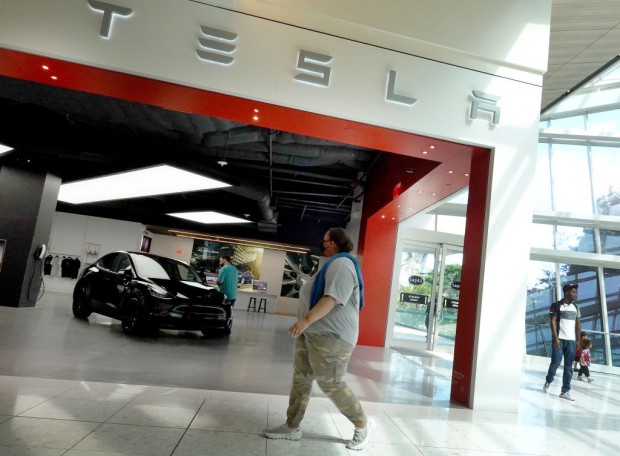MIAMI, FLORIDA - A Tesla Model Y electric vehicle is displayed on a showroom floor at the Miami Design District on October 21, 2021 in Miami, Florida.
(Photo : Joe Raedle/Getty Images)
Panasonic will start mass-producing the next-generation lithium-ion batteries for electric carmaker Tesla in the year 2023, according to a report by Nikkei Asia. The new batteries have five times the energy capacity of existing models, boosting the range of electric cars in the process.
Tesla would want nothing more than to acquire that technology to make its electric cars more affordable to produce and sell. The world's leading electric automaker is preparing to start production of its first car using the larger, higher-capacity battery cells. They have been named 4680 cells because the battery measures 46mm x 80mm in size.
According to Nikkei, the batteries could increase the range of electric cars by around 20 percent. Tesla's studies showed the 4680 battery cell increasing its vehicles' range by 16 percent. For example, a flagship Model S would now be able to travel for 750 kilometers compared to its previous range of 650 kilometers, a game-changer in the electric vehicle wars.
Panasonic to invest $700 million for the 4680 battery production
Tesla highlighted these next-generation battery cells at an event back in September 2020. Chief executive officer Elon Musk said then that the 4680 cells are six times more powerful, and they would reduce the cost per kWh by 14 percent.
Panasonic knows this fully well, with the Japanese company investing $700 million to produce the 4680 battery cell for Tesla. Tesla needs so many battery cells with its vehicles in high demand, forcing the company to partner with current battery suppliers to help production.
Panasonic is Tesla's oldest battery partner, and that partnership will continue for the foreseeable future with the Japanese firm giving the green light to the massive 80 billion yen investment. The huge outlay will be used to expand Panasonic's plant in Wakayama, Japan, the facility where the batteries will be mass-produced.
Although Panasonic will primarily manufacture the batteries for Tesla, an executive in a November interview did not rule out supplying the 4680 cells to other companies. Panasonic issued a statement to Reuters, with the Japanese company declining to confirm Nikkei's report about the investment.
Related Article: Stellantis Steals Show at CES With Showcase of Chrysler Airflow EV Concept: Will They Sell This Car?
Panasonic targets production output of 10 GWh at Wakayama plant
Panasonic said they are studying various options for mass production, including a test production line they are establishing this business year. Panasonic added that they don't have anything to announce at this time.
According to the Nikkei report, Panasonic plans a production output of less than 10 GWh at the Wakayama plant. With the battery's average pack size of 60 kWh, the plant can produce cells for at least 150,000 vehicles per year.
Panasonic is expected to expand its production lines for 4680 cells, though, with the Japanese firm likely to produce these batteries at Tesla's factories in Nevada and Fremont in the future. Apart from Panasonic, Samsung, LG, and CATL are also planning to make 4680 cells for Tesla.
READ MORE ON AWN:
Shakeup at Tesla as Company's Top Black Executive Steps Down as HR Chief
Maserati To Race in Formula E for 2023 Season; Provides Major Boost to All-electric Series
See Now: OnePlus 6: How Different Will It Be From OnePlus 5?



























